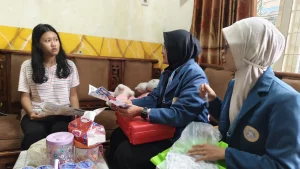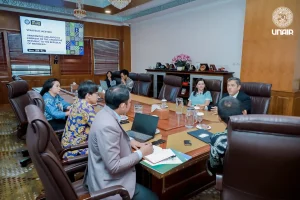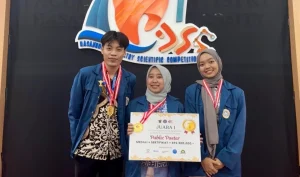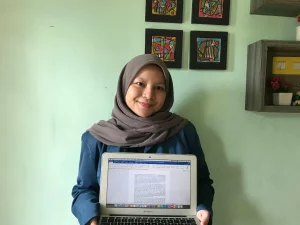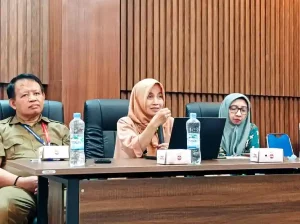UNAIR NEWS – From one banana tree, we can utilize all parts of it for various purposes. Starting from the tip of the leaf to the root. But has we ever thought, if the banana tree fiber was also able to be processed into sheets of woven fabric?
Nuzulul Azizah Ramdan Wulandari, initiated the idea of recycling banana tree fiber and then combine it with weaving techniques. The result, created woven fabric made from banana tree fiber.
The inspiration came when the student of Medical Faculty UNAIR was reading the journal.
“A journal explained that in Japan, doctors use banana tree fiber as a surgical thread. From here, I started looking for ways how to combine banana fibers so that they can be woven like silk, ” she said.
From that idea, Wulan then inspired to do business with it. After successfully obtaining the Student Creativity Program (PKM) fund from DIKTI in 2014, Wulan and her team worked together to start a Clothing Line business they named Fibrinana .
Initially, Fibrinana only produces bags and shoes. But now, production is more directed to woven fabrics. According to her, processed material of banana tree fibers can be combined with hand woven materials and leather.
The fibers of the trees can be a sheet of woven fabric through a series of processing.
“The tree part is grated, then soaked for some time. Once it is dried, then tied up, the bonds of these fibers are then woven, “said the fans of silk shoes.
Because of its natural material, the woven fabric from banana fibers requires special treatment. Fibrinana woven clothes can be more durable with manual washing without a washing machine.
“The safest is dry clean only,” said the woman born in February 1995.
Fibrinana is currently managed by several teams, including tenant team who works when Fibrinana joins design or property exhibitions, a web development team responsible for managing Fibrinana pages , and an IT Division team serving as administrators as well as managing social media designs, lookbook designs, and brandprofile design .
Every month, the revenue of this business can reach 3-5 million rupiah. About the designs, the 2013 FK UNAIR student involves a number of young designers, but she herself also often designs.
“The selection depends on the theme of the season . Every three months the season changes. There are only outer, there is also combination of border. Next season, we want it to be full color using natural color, ” she explained.
For one piece of woven fashion, Fibrinana is priced from 300 thousand to 1 million rupiah, depending on the combination of materials used.
“There is a combination of fiber and hand woven, there is also a combination of fiber and leather, or fiber and silk. The most expensive is that using 100 percent fiber material without any combinations, ” she said.
Currently, Fibrinana works with a number of cafes in Jakarta, a music school and studio recording in Bandung, some cafes in Malang and Surabaya, and a skincare clinic in Surabaya. The system, when customers get Fibrinana membercard , they will get a discount when visiting the place.
As a novice in Clothing Line business, Wulan is ready for competition. Eco green, recycle, back to nature often echoed as slogan of foreign companies apparently motivate Fibrinana to compete with foreign products.
“People in Thailand have a special cloth made of pineapple fibers. We are also developing fabric from banana tree fibers. Both are utilizing waste materials to produce high-value products. Fibrinana clothing is made from nature so it is organic and can blend with the soil when it is not used, ” she said.
From her observations so far, actually a lot of overseas products use woven materials and products of Micro, Small and Medium Enterprises (UMKM) in Indonesia. They buy materials from Indonesia at a cheap price but resell them at a higher price.
“The majority of foreign products only excel on their coloring and paperbag that embraces the culture. While Fibrinana has a plus value as it uses natural materials, banana tree fiber. While in Indonesia, competitors who play with natural materials are still limited. Therefore, Fibrinana has a big opportunity to dominate the market, ” she explained.
To Prague
Two years since its establishment, Fibrinana has received many orders from various regions in Indonesia also overseas, such as Jakarta, Surabaya, to Prague. Wulan himself has even been invited to speak in some inspirational talk show , and won the Top 5 Enterpreneur by Madeinkampus . Not only that, Wulan also had the opportunity to feature with designer clothing from Singapore.
As Fibrinana clothing line business is new, Wulan did not deny if the business trip is still constrained by many things. Particularly, in terms of dividing the time between college and business.
“Running a business while studying is not easy. But I realized I had to go back to be a student of FK UNAIR. I remember my parents’ message that your profession will be a field of service and social profession where you do not see personal profit, but you have to have business to get income later, ” she said.
In the future, Wulan expected Fibrinana to grow bigger and has more enthusiasts. In addition to working with many fresh designers , Wulan hoped Fibrinana to have its own store located in Surabaya. She also hoped Fibrinana to become a local brand of FK UNAIR. Wulan has determined that woven fabric of banana tree fiber of his can be a national fabric that represents Indonesia like batik.
“Hopefully Fibrinana can expand to several tourist cities, such as Yogyakarta and Bali. Because in Yogya, local products are more appreciated, while in Bali the tourists are known to be very fond of the products concept back to nature , “he said. (*)
Author: Sefya Hayu
Editor: Binti Q. Masruroh


